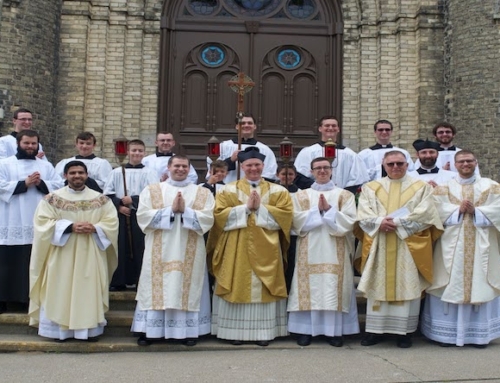The redemptive sacrifice of Jesus Christ on the Cross gives us the hope of eternal life with God and the final resurrection—the hope of fully enjoying God’s presence forever. In light of this wondrous hope, we Christians can find ourselves feeling guilty for our sadness. Instead of mourning the loss of a loved one, we think that we instead ought to be happy for the deceased’s hopeful enjoyment of the beatific vision. This notion has led us often to forgo a mournful, tearful, dirge-filled funeral, for a forced “celebration of life” in its place. A celebration of life can often overlook the importance of praying for the soul of the deceased—the tradition of the Church since her earliest days. Saint Thomas Aquinas writes that praying for the dead is an expression of charity (ST Suppl. q. 71, a. 2). But the process of celebrating one’s life actually finds its fitting place in the sadness of mourning.
Aquinas identifies sorrow as arising from the recognition of something lacking, a lacking that effects us in a painful and interior way (ST I-II, q. 35). When we are mourning a loved one, we feel this interior pain because we are coming to terms with the reality: this person whom we loved so much is no longer with us. It is precisely in this painful process of mourning that the goodness of the person becomes more apparent to us, which can have the effect of intensifying our sadness (cf. ST I-II, q. 37).
This mourning period—painful as the stirring up of our memory of the person is—can be an opportunity to be thankful to God. In our recollections, we think of the person we miss (how he talked, treated us kindly, etc.). As we think of these qualities, we come to realize how God’s ever present love has been working in our lives for our good, in its own mysterious way. It turns out that what we are really missing is not just the person in himself, but the goodness which God endowed him with in his own particular way. We miss this particular instantiation of the goodness of God as it overflowed and was constructed in this person.
We then have the opportunity to thank God for the blessings of this person, and ask that he give us the same good gifts to carry on the legacy of our beloved deceased by following his good example. In this way, the deceased’s life continues to be conducive to our salvation for years to come. Asking the question “What would dad have done in this situation?” is actually a recognition that dad had some really good qualities, ones which could come in handy right now. If we take the time to reflect on those good qualities, we may more easily live a virtuous life conducive to our salvation through the gifts God has given to the departed.
We know from our Lord’s example in mourning for Lazarus that mourning in itself is not a bad thing (John 11:35). Jesus also said “blessed are those who mourn for they will be comforted” (Matt 5:4). Saint Thomas also observes that perfect happiness is only really possible in the life to come—when we have achieved our ultimate goal of union with God, the supreme and infinite good (ST I-II q. 1-5). Aquinas also echoes the words of Jesus in the Sermon on the Mount, saying that the sorrows of the present life lead us to the comfort of the future life (ST I-II, q. 35, a. 3, ad 1). In other words, the mere fact that we are not happy now is proof that we will be happy in the future, for God does not give us any desire which he himself does not intend to satisfy in his own perfect way. So let us mourn now, but do so with the joy for the gifts given to us through our loved ones here in this present life, and with the prayerful hope of enjoying them perfectly in the life to come.
✠
Image: Fritz von Uhde, Abandoned







